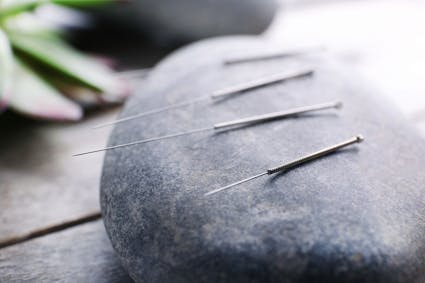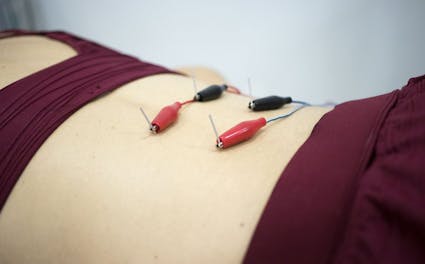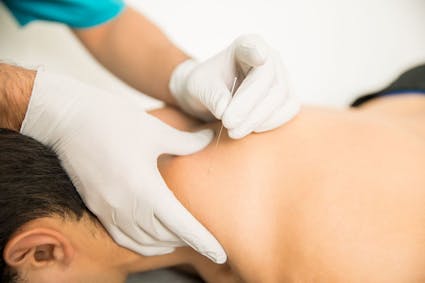
What is Dry Needling?
Dry needling is a treatment that releases muscular tender points or trigger points. It eases pain, improves range of motion, and enhances muscle function.
Tender points are just that, they're points in the muscle that are tender to the touch. They might feel like a lump or knot in the muscle. If a tender point is particularly irritated, it may ache even when it is not being touched. Trigger points are similar to tender points, but they cause pain not only where they are but also refer pain to various parts of the body. For example, the sternocleidomastoid muscle in the neck may refer pain to the head and cause a headache. Trigger points in the piriformis muscle in the buttock, may cause sciatic-like pain down the thigh and lower leg. Trigger points in the inner thigh may refer to the pelvic floor. Dry needling releases these muscular tender points and trigger points and helps break the cycle of pain and dysfunction.

In dry needling, a specially-trained physical therapist inserts a small, thin, needle into the muscle being treated. As the needle enters a tender point or trigger point, you may feel a quick muscle spasm or twitch. This means the therapist has successfully targeted your trigger point.
Sometimes, the therapist will add electrical stimulation to the needle. For certain people, adding electrical stimulation helps the muscle to function better than it would with the needle alone. In the hours and days following treatment, you should notice a decrease in pain and muscle tension in the treated area.
Dry needling can be an effective treatment for a variety of musculoskeletal conditions, including:
- Muscle Pain and Tension: Whether it's from overuse, injury, or poor posture, muscle pain and tension may significantly impact daily activities. Dry needling can help release tight muscles and restore normal function.
- Chronic Pain Syndromes: Conditions such as myofascial pain syndrome, chronic pelvic pain, tension headache, and others may benefit from dry needling as part of a comprehensive pain management plan.
- Joint Dysfunction: Tight muscles surrounding joints can contribute to joint stiffness and limited range of motion. Dry needling can help address these muscular imbalances and improve joint mobility.
- Sports Injuries: Athletes often experience muscle tightness and trigger points as a result of intense training or repetitive movements. Dry needling can aid in the recovery process and enhance athletic performance.


Get Started Today
If you have muscular pain, tension, or restricted movement, you may be a good candidate for dry needling. Contact us today to schedule a consultation with one of our skilled physical therapists and take the first step towards a pain-free, active lifestyle.
